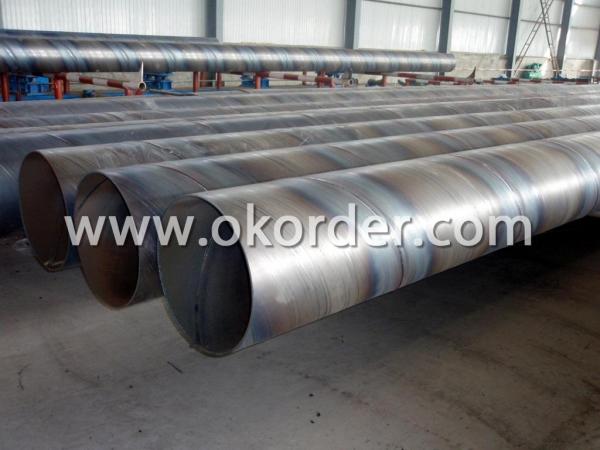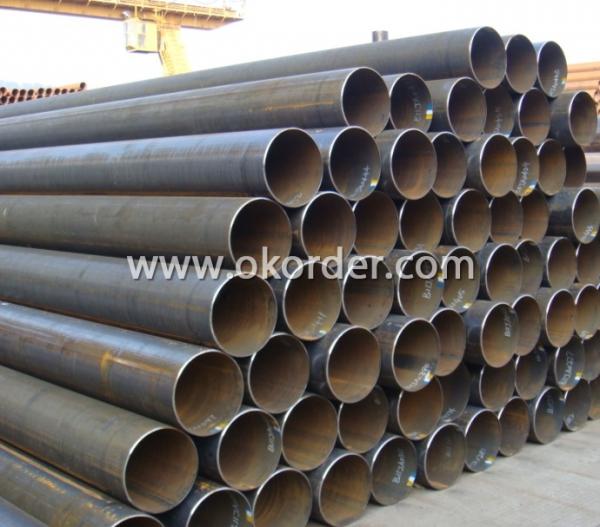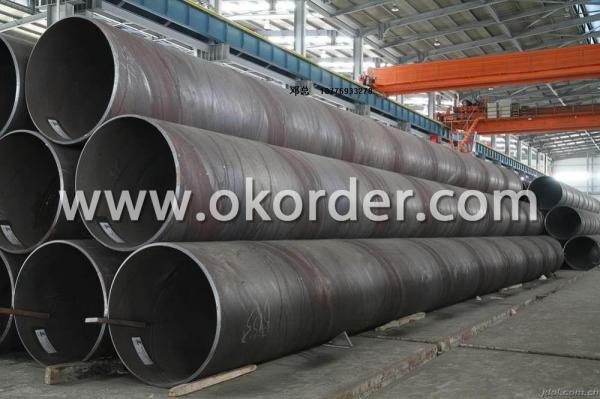SSAW Welded Steel Pipes API SPEC 5L API SPEC 5CT ASTM A53 GB/T9700.1 Black Line Pipe
- Loading Port:
- Tianjin Port
- Payment Terms:
- TT or L/C
- Min Order Qty:
- 50MT m.t.
- Supply Capability:
- based on order m.t./month
OKorder Service Pledge
OKorder Financial Service
You Might Also Like
1.Specification of SSAW Welded Steel Pipes API SPEC 5L, API SPEC 5CT, ASTM A53, GB/9700.1 Black
1)Application: It is widely applied to line pipe in oil and sewage transportation , and it is used in Low pressure liquid and gassy transportation and it is also good Structure pipe in building and bridge field.
2)Standard: API SPEC 5L, API SPEC 5CT, ASTM A53, GB/T9700.1
3)Steel Grade: API SPEC 5L: B, X42, X46, X52, X56, X60, X65;API SPEC 5CT: J55, K55, N80, L80-1; ASTM A53: A, B, C;GB/T9700.1:L242、L290、L320、L360、L390、L415、L450
2.Sizes of Pipes
*Remark: Besides below sizes, we also can arrange production based on requirement of customers
OD | WT | ||||||||
Noninal Pipe size Inches | OD MM | 10 | 20 | 30 | STD | 40 | 60 | XS | 80 |
12 | 323.90 |
| 6.35 | 8.38 | 9.53 | 10.31 | 14.27 | 12.70 | 17.48 |
14 | 355.60 | 6.35 | 7.92 | 9.53 | 9.53 | 11.13 | 15.09 | 12.70 | 19.05 |
16 | 406.40 | 6.35 | 7.92 | 9.53 | 9.53 | 12.7 | 16.66 | 12.70 | 21.44 |
18 | 457.00 | 6.35 | 7.92 | 11.13 | 9.53 | 14.27 | 19.05 | 12.70 | 23.88 |
20 | 508.00 | 6.35 | 9.53 | 12.7 | 9.53 | 15.09 | 20.62 | 12.70 | 26.19 |
22 | 559.00 | 6.35 | 9.53 | 12.7 | 9.53 |
| 22.23 | 12.70 | 28.58 |
24 | 610.00 | 6.35 | 9.53 | 14.27 | 9.53 | 17.48 | 24.61 | 12.70 | 30.96 |
26 | 660.00 | 7.92 | 12.70 |
| 9.53 |
|
| 12.70 |
|
28 | 711.00 | 7.92 | 12.70 | 15.88 | 9.53 |
|
| 12.70 |
|
30 | 762.00 | 7.92 | 12.70 | 15.88 | 9.53 |
|
| 12.70 |
|
32 | 813.00 | 7.92 | 12.70 | 15.88 | 9.53 | 17.48 |
| 12.70 |
|
34 | 864.00 | 7.92 | 12.70 | 15.88 | 9.53 | 17.48 |
| 12.70 |
|
36 | 914.00 | 7.92 | 12.70 | 15.88 | 9.53 | 19.05 |
| 12.70 |
|
38 | 965.00 |
|
|
| 9.53 |
|
| 12.70 |
|
40 | 1016.00 |
|
|
| 9.53 |
|
| 12.70 |
|
42 | 1067.00 |
|
|
| 9.53 |
|
| 12.70 |
|
44 | 1118.00 |
|
|
| 9.53 |
|
| 12.70 |
|
46 | 1168.00 |
|
|
| 9.53 |
|
| 12.70 |
|
48 | 1219.00 |
|
|
| 9.53 |
|
| 12.70 |
|
3.Packing & Delivery
1) Packing Detail:Bundles with anti-rust painting and with plastic caps
2) Delivery Term: 30-40 days after receving prepayment or L/C
4.Data Sheet
Standard: API SPEC 5L
Mechanical Properties
Standard | Grade | (MPa) | (MPa) | ||
Yield strength | Tensile Strength | ||||
API SPEC 5L | PSL1 | ||||
B | ≥241 | ≥414 | |||
×42 | ≥290 | ≥414 | |||
×46 | ≥317 | ≥434 | |||
×52 | ≥359 | ≥455 | |||
×56 | ≥386 | ≥490 | |||
×60 | ≥414 | ≥517 | |||
×65 | ≥448 | ≥531 | |||
×70 | ≥483 | ≥565 | |||
PSL2 | |||||
Min | Max | Min | Max | ||
B | 241 | 448 | 441 | 758 | |
×42 | 290 | 496 | 414 | 758 | |
×46 | 317 | 524 | 434 | 758 | |
×52 | 359 | 531 | 455 | 758 | |
×56 | 386 | 544 | 490 | 758 | |
×60 | 414 | 565 | 517 | 758 | |
×65 | 448 | 600 | 531 | 758 | |
×70 | 483 | 621 | 565 | 758 | |
Chemical Composition(%)
Standard | Grade | C | Mn | P | S | TI | CEV |
Max | Max | Max | Max | Max | Max | ||
API SPEC 5L | PSL1 | ||||||
B | 0.26 | 1.2 | 0.030 | 0.030 | 0.04 |
- | |
×42 | 0.26 | 1.3 | 0.030 | 0.030 | 0.04 | ||
×46,×52,×56,X60 | 0.26 | 1.4 | 0.030 | 0.030 | 0.04 | ||
X65 | 0.26 | 1.45 | 0.030 | 0.030 | 0.06 | ||
X70 | 0.26 | 1.65 | 0.030 | 0.030 | 0.06 | ||
PSL2 | |||||||
B | 0.22 | 1.20 | 0.025 | 0.015 | 0.04 |
0.43 | |
×42 | 0.22 | 1.30 | 0.025 | 0.015 | 0.04 | ||
×46,×52,×56, X60 | 0.22 | 1.40 | 0.025 | 0.015 | 0.04 | ||
X65 | 0.22 | 1.45 | 0.025 | 0.015 | 0.06 | ||
X70 | 0.22 | 1.65 | 0.025 | 0.015 | 0.06 | ||
Standard: GB/9711.1
Mechanical Properties
Standard | Grade | (MPa) | (MPa) | Min(%) |
Yield strength | Tensile Strength | Elongation | ||
GB/T9711.1 | L245 | ≥245 | ≥415 | 21 |
L290 | ≥290 | ≥415 | 21 | |
L320 | ≥320 | ≥435 | 20 | |
L360 | ≥360 | ≥460 | 19 | |
L390 | ≥390 | ≥490 | 18 | |
L415 | ≥415 | ≥520 | 17 | |
L450 | ≥450 | ≥535 | 17 | |
L485 | ≥485 | ≥570 | 17 |
Chemical Composition(%)
Standard | Grade | C | Mn | P | S |
Max | Max | Max | Max | ||
GB/T9711.1 | L245 | 0.26 | 0.15 | 0.030 | 0.030 |
L290 | 0.28 | 1.25 | 0.030 | 0.030 | |
L320, L360 | 0.30 | 1.25 | 0.030 | 0.030 | |
L390, L415 | 0.26 | 1.35 | 0.030 | 0.030 | |
L450 | 0.26 | 1.40 | 0.030 | 0.030 | |
L485 | 0.23 | 1.60 | 0.025 | 0.030 |
Standard: GB/9711.2
Mechanical Properties
Standard | Grade | (MPa) Yield strength | (MPa) Tensile Strength | Min(%) Elongation | ||
GB/T9711.2 | Rt0.5Min | Rt0.5Max | RmMin | Rt0.5/Rm Max | ||
L245 | 245 | 440 | 0.80 |
22 | ||
L245 | 0.85 | |||||
L290 |
290 | 440 | 0.80 | 21 | ||
L290 | 0.85 | |||||
L360 |
360 | 510 | 0.85 |
20 | ||
L360 | 0.85 | |||||
L415 | 415 | 565 | 0.85 |
18 | ||
L415 | 0.85 | |||||
L450 | 450 | 570 | 535 | 0.87 | 18 | |
L485 | 485 | 605 | 570 | 0.90 | 18 | |
Chemical Composition(%)
Standard | Grade | C | Mn | P | S | V | Nb | Ti | CEV |
Max | Max | Max | Max | Max | Max | Max | Max | ||
GB/T9711.2 | L245NB | 0.16 | 1.1 | 0.025 | 0.020 | - | - | - | 0.42 |
L290NB | 0.17 | 1.2 | 0.025 | 0.020 | 0.05 | 0.05 | 0.04 | 0.42 | |
L360NB | 0.20 | 1.6 | 0.025 | 0.020 | 0.10 | 0.05 | 0.04 | 0.45 | |
L415NB | 0.21 | 1.6 | 0.025 | 0.020 | 0.15 | 0.05 | 0.04 | - | |
L245NB, L290NB |
0.16 |
1.5 | 0.025 | 0.020 |
0.04 |
0.04 |
- |
0.4 | |
L360NB | 0.16 | 1.6 | 0.025 | 0.020 | 0.05 | 0.05 | 0.04 | 0.41 | |
L415NB | 0.16 | 1.6 | 0.025 | 0.020 | 0.08 | 0.05 | 0.06 | 0.42 | |
L450NB | 0.16 | 1.6 | 0.025 | 0.020 | 0.10 | 0.05 | 0.06 | 0.43 | |
L485NB | 0.16 | 1.7 | 0.025 | 0.020 | 0.10 | 0.06 | 0.06 | 0.43 |
5. Products Showroom



- Q:How are steel pipes tested for strength and durability?
- Steel pipes are typically tested for strength and durability through various methods, including non-destructive testing techniques such as ultrasonic testing, magnetic particle inspection, and visual inspection. These tests help identify any potential defects, cracks, or flaws in the pipes. Additionally, destructive tests like tensile testing and impact testing are conducted to measure the strength and toughness of the steel pipes. These rigorous testing procedures ensure that the pipes meet the required standards and can withstand the intended applications.
- Q:Can steel pipes be used for sewage and wastewater systems?
- Yes, steel pipes can be used for sewage and wastewater systems. Steel pipes offer durability, strength, and resistance to corrosion, making them suitable for conveying sewage and wastewater. Additionally, steel pipes can handle high-pressure flows and are often used in larger diameter applications, making them a reliable choice for sewage and wastewater systems.
- Q:Can steel pipes be used for gas transportation?
- Yes, steel pipes can be used for gas transportation. Steel is a commonly used material for gas pipelines due to its strength, durability, and resistance to corrosion. Steel pipes are able to withstand high pressures and are suitable for transporting both natural gas and propane. They are also capable of withstanding extreme temperatures, making them ideal for gas transportation in various environments. Additionally, steel pipes can be welded together, allowing for a seamless and continuous pipeline system. However, it is important to ensure that the steel pipes used for gas transportation are properly coated and protected against corrosion to prevent any leaks or damage to the pipeline.
- Q:How do you clean and maintain steel pipes?
- To clean and maintain steel pipes, start by removing any dirt, dust, or debris using a soft cloth or brush. Then, use a mild detergent mixed with water to wash the pipes thoroughly. Rinse them with clean water and dry them completely to prevent rusting. Regularly inspect for any signs of corrosion or damage, and promptly address any issues. Applying a rust-resistant coating can also help in maintaining the pipes' longevity.
- Q:How are steel pipes used in the manufacturing of HVAC systems?
- Steel pipes are commonly used in the manufacturing of HVAC systems for various purposes. They are used to transport fluids, such as water or refrigerants, throughout the system. Steel pipes are also used for exhaust systems and ventilation, providing a durable and corrosion-resistant solution. Additionally, steel pipes are used in the construction of HVAC equipment, such as heat exchangers and boilers, due to their strength and ability to withstand high temperatures and pressures. Overall, steel pipes play a crucial role in the efficient and reliable functioning of HVAC systems.
- Q:What are the factors to consider when selecting steel pipes?
- When selecting steel pipes, there are several factors that need to be considered. These factors include the intended application, the required dimensions and specifications, the level of corrosion resistance needed, the operating temperature and pressure, the cost, and the availability of the specific type of steel pipe. It is important to carefully evaluate these factors to ensure that the selected steel pipes are suitable for the intended use and meet all the necessary requirements.
- Q:Can steel pipes be used for nuclear power plants?
- Yes, steel pipes can be used for nuclear power plants. Steel pipes are commonly used for various applications in nuclear power plants, such as transporting coolant, steam, and other fluids. They are selected based on their ability to withstand high temperatures, pressures, and corrosive environments. However, specific requirements and regulations related to nuclear safety and radiation protection must be strictly followed during the design, fabrication, and installation of steel pipes in nuclear power plants.
- Q:What is the difference between steel pipe and PVC pipe?
- Steel pipe is made from a combination of iron and carbon, giving it strength and durability. It is used for heavy-duty applications, such as plumbing and gas lines, as it can withstand high pressure and extreme temperature. On the other hand, PVC (polyvinyl chloride) pipe is a plastic pipe that is lightweight, easy to install, and resistant to corrosion and chemicals. It is commonly used for plumbing, irrigation, and drainage systems, but not suitable for high-pressure applications.
- Q:What are the different methods of joining steel pipes together?
- There are several methods of joining steel pipes together, each with its own advantages and disadvantages. 1. Welding: This is the most common and widely used method of joining steel pipes. It involves heating the ends of the pipes and applying pressure to fuse them together. Welding provides a strong and durable joint, but it requires skilled labor and specialized equipment. 2. Threaded connections: Steel pipes can also be joined by threading the ends and using threaded fittings to connect them. This method is relatively easy and quick, but it may not be as strong as welding and can be prone to leakage if not properly sealed. 3. Flanged connections: Flanges are used to connect pipes by bolting them together. This method allows for easy disassembly and reassembly, making it suitable for applications that require frequent maintenance or repair. Flanged connections are also highly resistant to leakage. 4. Compression fittings: Compression fittings are used to join steel pipes by compressing a ring or ferrule onto the pipe, creating a tight seal. This method is simple and does not require heat or welding, making it ideal for applications where heat or sparks are not permissible. 5. Grooved connections: Grooved connections involve cutting grooves into the pipe ends and using mechanical couplings to secure them together. This method is fast, reliable, and allows for easy assembly and disassembly. Grooved connections are commonly used in fire protection systems. 6. Brazing: Similar to welding, brazing involves heating the pipe ends and adding a filler material to join them together. This method is often used for smaller diameter pipes and provides a strong joint. However, it requires the use of a high-temperature torch and skilled labor. Each of these methods has its own advantages and is suitable for different applications. The choice of joining method depends on factors such as the required strength, ease of installation, maintenance requirements, and the type of pipe being used.
- Q:Can steel pipes be used for hydraulic systems?
- Yes, steel pipes can be used for hydraulic systems. Steel pipes are commonly used in hydraulic systems due to their high strength, durability, and ability to handle high pressure. They provide excellent resistance to corrosion and can effectively transport hydraulic fluids, making them a suitable choice for various hydraulic applications.
1. Manufacturer Overview |
|
|---|---|
| Location | Tianjin, China |
| Year Established | 2001 |
| Annual Output Value | 500,000Tons |
| Main Markets | Southeast Asia; Middle East; Oceania; Americas; Europe; Africa;etc. |
| Company Certifications | API 5L;API 5CT;ISO9001:2008 GB/T 19001-2008 |
2. Manufacturer Certificates |
|
|---|---|
| a) Certification Name | |
| Range | |
| Reference | |
| Validity Period | |
3. Manufacturer Capability |
|
|---|---|
| a)Trade Capacity | |
| Nearest Port | Tianjin;Qingdao |
| Export Percentage | 50% - 60% |
| No.of Employees in Trade Department | 1000-1100 People |
| Language Spoken: | English; Chinese; Spanish |
| b)Factory Information | |
| Factory Size: | Above 150,000 square meters |
| No. of Production Lines | Above 10 |
| Contract Manufacturing | OEM Service Offered; Design Service Offered |
| Product Price Range | Average |
Send your message to us
SSAW Welded Steel Pipes API SPEC 5L API SPEC 5CT ASTM A53 GB/T9700.1 Black Line Pipe
- Loading Port:
- Tianjin Port
- Payment Terms:
- TT or L/C
- Min Order Qty:
- 50MT m.t.
- Supply Capability:
- based on order m.t./month
OKorder Service Pledge
OKorder Financial Service
Similar products
New products
Hot products
Related keywords































